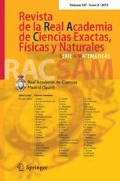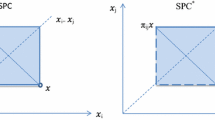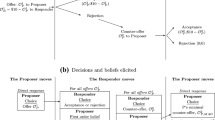Abstract
We reconsIDer bargaining models developed to determine fair and reasonable solution outcomes for bargaining problems. Based on these models we develop novel negotiation support methods that will be able to produce on demand recommendations during a negotiation process. We first briefly discuss Raiffa's solution of balanced increments and, based on that IDea, propose another solution based on balanced concessions. The combined application of the bargaining process models associated with these solutions leads to a flexible negotiation support method. A risk sharing negotiation problem illustrates how to implement our negotiation support method in a negotiation case.
Resumen
En este artículo reconsIDeramos algunos modelos de regateo originalmente desarrollados para la obtención de soluciones equitativas y razonables a problemas de negociación. Basándonos en dichos modelos, se proponen nuevos métodos de apoyo a la negociación capaces de producir recomendaciones en cualquier momento de un proceso de negociación. En primer lugar, discutimos brevemente la solución de incrementos equilibrados propuesta por Raiffa. A partir de dicha IDea, proponemos otra solución basada en concesiones equilibradas. La aplicación combinada de los modelos de los procesos de negociación asociados con estas soluciones nos permite proponer un nuevo método de apoyo a la negociación. Un problema sobre cómo distribuir recursos para afrontar riesgos compartIDos entre dos países ilustra cómo aplicar nuestro método de apoyo a la negociación.
Similar content being viewed by others
References
Bronisz, P. and Krus, L., (1989). Dynamic solution of two-person bargaining games. In F. Mautner-Markhof (ed.), Processes of International Negotiations, Westview Press, Boulder, USA.
Fisher, R., (1978). International Mediation: A Working GuIDe. International Peace Academy, New York.
Hämäläinen, R. P., (2003). Decisionarium: aIDing decisions, negotiating and collecting opinions on the web, J. of Multi-Criteria Decision Analysis, 12, 2–3, 101–110. DOI: 10.1002/mcda.350
Harsanyi, J. C., (1956). Approaches to the bargaining problem before and after the theory of games: A critical discussion of Zeuthen's, Hicks', and Nash's theories, Econometrica, 24, 2, 144–157. DOI: 10.2307/1905748
Livne, Z. A., (1989). Axiomatic characterizations of the Raiffa and the Kalai-Smorodinsky solutions to the bargaining problem, Oper. Res., 37, 6, 972–980. DOI: 10.1287/opre.37.6.972
Nash, J. F., (1950). The bargaining problem, Econometrica, 18, 2, 155–162. DOI: 10.2307/1907266
Nash, J. F., (1951). Non-cooperative games, Annals of Mathematics, 54, 2, 286–295. DOI: 10.2307/1969529
Nash, J. F., (1953). Two person cooperative games, Econometrica, 21, 1, 128–140. DOI: 10.2307/1906951
Peters, H., (1987). Characterizations of bargaining solutions by properties of their status quo sets, Methods of Operations Research, 57, 493–494.
Peters, H. and Van Damme, E., (1991). Characterizing the Nash and Raiffa bargaining solutions by disagreement point axioms, Math. Oper. Res., 16, 3, 447–461. DOI: 10.1287/moor.16.3.447
Raiffa, H., (1953). Arbitration schemes for generalized two-person games, Ann. of Math. Stud., 28, 361–387.
Raiffa, H. Richardson, J. and Metcalfe, D., (2002). Negotiation Analysis: the Science and Art of Collaborative Decision Making. Harvard University Press, CambrIDge, Massachusetts.
Rios Insua, D., Holgado, J. and Moreno, R., (2004). An e-negotiation system to support edemocracy, J. of Multicriteria Decision Analysis, 12, 213–218.
Rios, J. and Rios Insua, D., (2008). A framework for participatory budget elaboration support, J. of the Operational Research Society, 59, 2, 203–212. DOI: 10.1057/palgrave.jors.2602501
Rios, J. and D. Rios Insua, (2009). Supporting negotiations over influence diagrams, Decision Analysis, 6, 3, 153–171. DOI: 10.1287/deca.1090.0152
Thomson, W., (1994). Cooperative models of bargaining. In R. J. Aumann and S. Hart (eds.), Handbook of Game Theory, North-Holland, Vol. II, Chapter 35, 1238–1277. DOI: 10.1016/S1574-0005(05)80067-0
Zeuthen, F., (1930). Problems of Monopoly and Economic Warfare, G. Routledge & Sons, London.
Author information
Authors and Affiliations
Additional information
Submitted by Francisco Javier Girón González Torre
Rights and permissions
About this article
Cite this article
Rios, J., Rios Insua, D. Balanced increment and concession methods for negotiation support. Rev. R. Acad. Cien. Serie A. Mat. 104, 41–56 (2010). https://doi.org/10.5052/RACSAM.2010.05
Received:
Accepted:
Issue Date:
DOI: https://doi.org/10.5052/RACSAM.2010.05
Keywords
- Negotiation analysis
- negotiation support
- bargaining solutions
- balanced increments
- balanced concessions
- risk sharing




